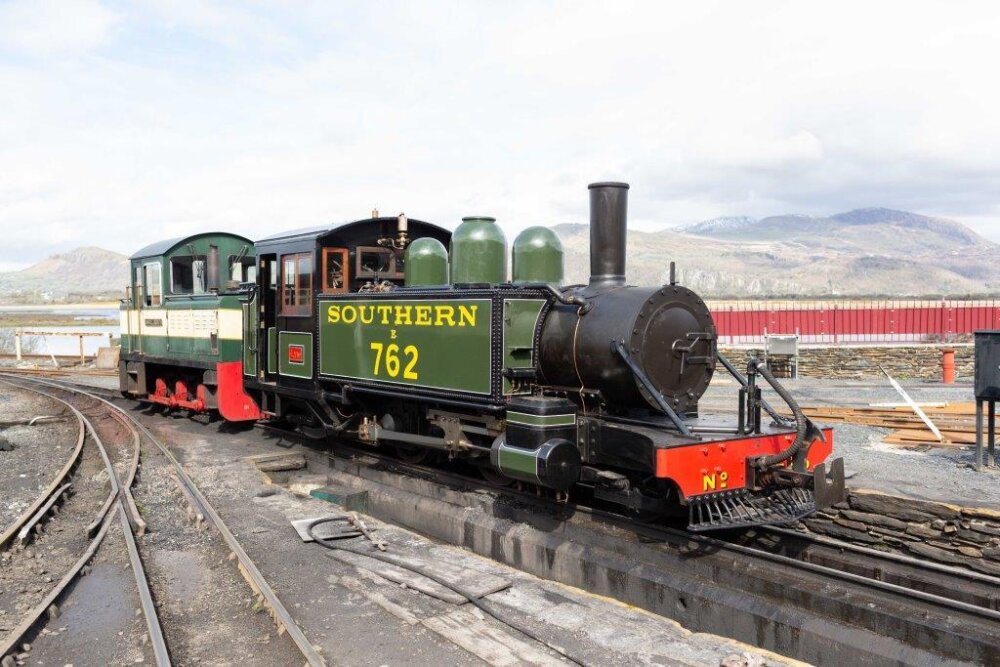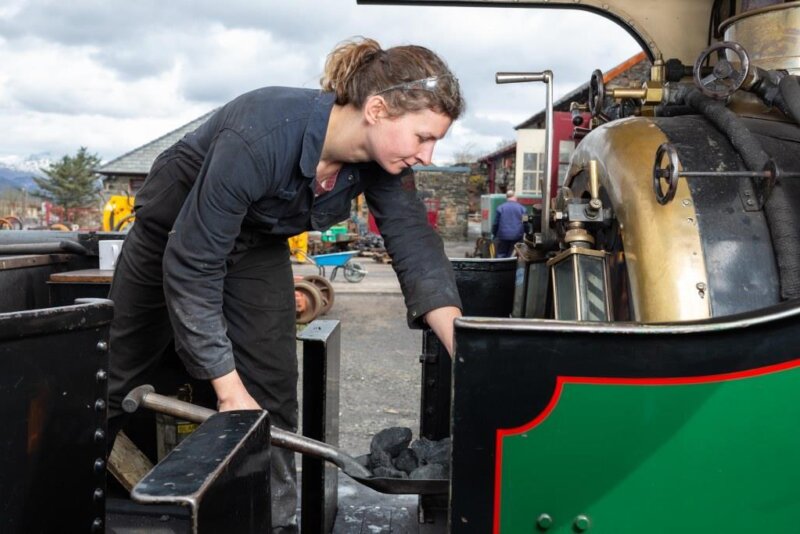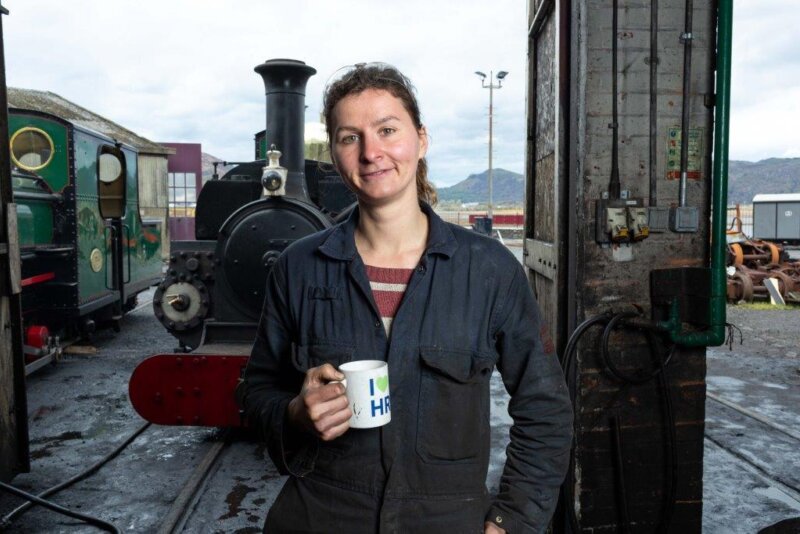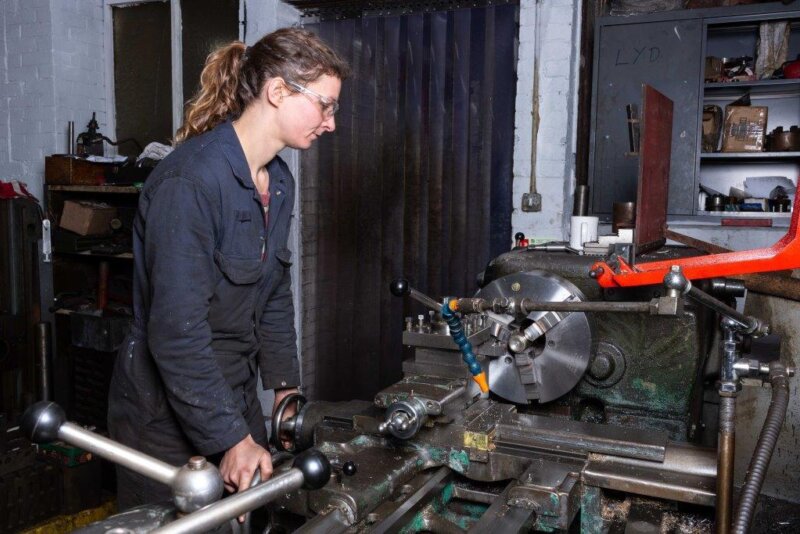WELSH AM MEETS THE NEXT GENERATION HELPING TO PRESERVE THE FUTURE OF OUR HERITAGE
31st January 2020
Mid and West Wales Assembly Member, Joyce Watson, today visited young trainees at the world’s oldest railway company to find out how they are playing a vital role in preserving the future of our heritage.

Heritage railways across the UK attract millions of visitors and passengers every year but a shortage of young people working or with the skills to work in the sector has been highlighted as a real source of concern with regards to safeguarding the future of the industry.
Today (3pm, Friday January 31st), Joyce Watson AM visited the Ffestiniog and Welsh Highland Railways in north Wales to find out how £454,500 in National Lottery good causes funding awarded in January 2018 has been used by the company to run an ambitious and innovative two-year training programme to help tackle the issue and encourage careers in the wider heritage sector.

The programme is aimed at introducing heritage skills to a more diverse audience including young people, women and those from black, Asian and minority ethnic communities. The initiative forms part of the National Lottery Heritage Fund’s £10.1 million ‘Skills for the Future’ scheme and 20 training placements have been created at Ffestiniog and Welsh Highland Railways - the world’s oldest narrow-gauge railway.
Mrs Watson had the opportunity to speak to some of the trainees involved and was given a unique guided tour of the project based at the Boston Lodge Works in Porthmadog which is playing a vital role in nurturing the next generation to help preserve the future of our heritage.

Each year the vintage locomotives of the Ffestiniog and Welsh Highland Railways take thousands of passengers on a journey from Blaenau Ffestiniog to Caernarfon via Porthmadog, a 40-mile trip that takes in some of Snowdonia’s most picturesque scenery. Maintaining the machinery and all the operating infrastructure is essential and the skills covered by the scheme include heritage joinery, heritage mechanical engineering, heritage horticulture and interpretation, the fundamentals necessary to communicate the significance of a heritage attraction to the public.
Amongst those learning essential heritage restoration skills as part of a scheme are 26-year-old Edward ‘Ed’ Laxton and 29-year-old Laurie Price. Based at the Boston Lodge railway workshops near the town of Porthmadog – a facility recognised by the Guinness Book of Records as the oldest railway engineering works in the world – Edward and Laurie are being taught and supervised by the railway’s highly experienced staff.

Ed says the trainee programme represents a steep learning curve, but he couldn’t be happier.
“I think I learn more in a day here than several months at school,” he says enthusiastically. “I could stop now, and I would have learned enough for it to be life changing.”
Ed is most happy standing in front of a lathe creating a component that will help bring a piece of vintage machinery back to life.
“A lot of the old machines are just better,” says the 26-year-old who has been working on some rather larger examples of machinery from a bygone age: the collection of steam engines belonging to the Ffestiniog and Welsh Highland Railways.
“They’re not just functionally better, they’re also works of art,” says Ed.
“A lot of them were made at a time when engineering was the pride of the nation and I really appreciate that.”

Laurie Price, 29, feels the same way. Like Ed, she is focussing on the maintenance of steam engines during her year as a trainee and her only regret is that she didn’t enrol in a similar course at a younger age. “I wish I’d done this ten years ago,” she says. “But I’m glad I’m here now. We’re here four days a week and we go to college one day a week to get qualifications in engineering.”
Laurie already has a degree in three-dimensional design and a masters in conservation, but she relishes getting her hands dirty and finds the Boston Lodge workshops are the perfect place to do it.
“In museums it’s all about preserving the objects - here it is making them work efficiently and well,” she explains. “You’re getting the locomotives ready for the season and there are deadlines that can’t be missed. I’m not an office kind of person. I much prefer coming in here and getting covered in dirt and going home knackered.”

Highlighting the importance of the National Lottery funded scheme, Paul Lewin, the Director and General Manager of Ffestiniog and Welsh Highland Railways, says: “For our national heritage to have a bright future we need to ensure that there are people with the skills necessary to conserve, work with and interpret our heritage assets. It is of vital importance that people from all backgrounds are attracted to be involved in our heritage at all levels. Also, as traditional heritage skills diverge from the requirements of mainstream industry, it is ever more important that we concentrate on developing those skills. This program, made possible through National Lottery funding, allows us to focus on these challenges in a way that we simply could not otherwise hope to do.”
Joyce Watson, Assembly Member for Mid and West Wales, has a longstanding engagement with training and apprenticeships and is a member of the National Assembly for Wales Economy, Infrastructure and Skills Committee.
Speaking about the importance of funding training schemes such as this one in the heritage sector, Joyce Watson AM, said: “In recent years concerns have been raised about skills and knowledge being lost and not replaced in the heritage sector. Without skilled heritage practitioners and skilled crafts people to conserve and repair, there is a significant threat to our historic environment in Wales.
“Having a skilled and experienced heritage workforce is key to addressing these challenges and I am delighted that the National Lottery has funded this worthwhile project which is aiding the development of skills provision and ensuring the future importance and success of the sector.
“The Welsh Government is committed to creating a better skilled and more diverse workforce. We must work together to invest in the next generation of people who bring our heritage to life to secure the future of our heritage organisations and enable them to flourish.”
The grant isn’t the first time The National Lottery has supported the development of the iconic Welsh railway. The £30 million restoration project – which was carried out in four phases – was supported by a £4.3 million grant from the National Lottery, alongside over £2.1 million of Welsh Government funding, European funding and other contributions. In October 1998, a £375,000 grant from The National Lottery Heritage Fund funded the extension of the carriage workshop at Boston Lodge and the restoration of two carriages built in 1872.
Notes to editors
For further information and images, please contact: Oswyn Hughes on 07976 324 179 or email oswyn.hughes@lotterygoodcauses.org.uk
Since The National Lottery’s first draw took place on 19 November 1994, more than £40 billion has been raised for good causes in the areas of arts, sport, heritage and community.
Over the past 25 years, over £1.75 billion has been invested into over 50,000 good causes in Wales, thanks to National Lottery players.
Every week, The National Lottery gives an average of £1.5 million to good causes in Wales, supporting more than 40 projects
The National Lottery has made more than 5,500 millionaires but its primary purpose is giving to good causes - over 565,000 individual grants have been awarded across the UK, that’s the equivalent of 200 life-changing projects in every UK postcode district.